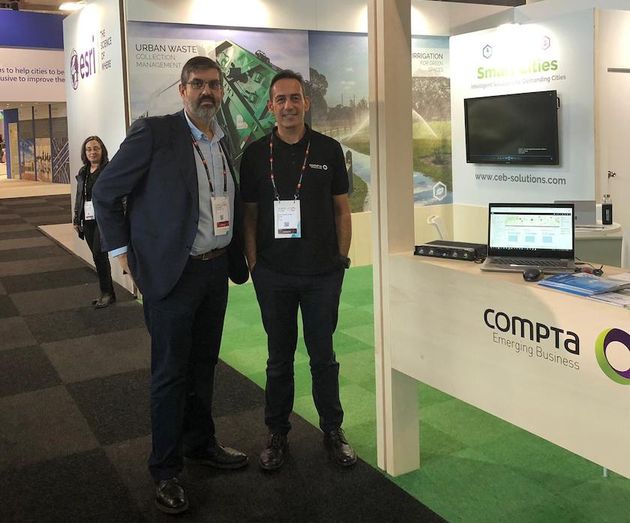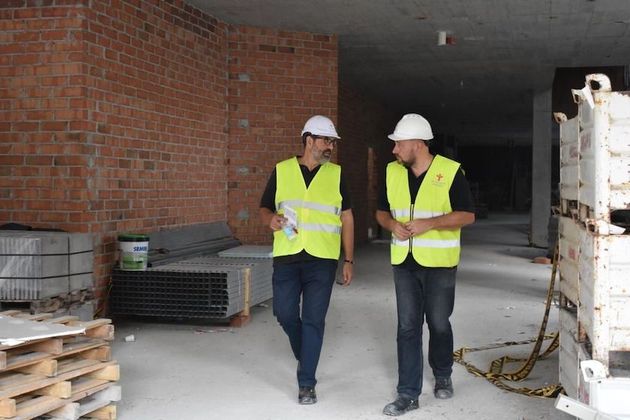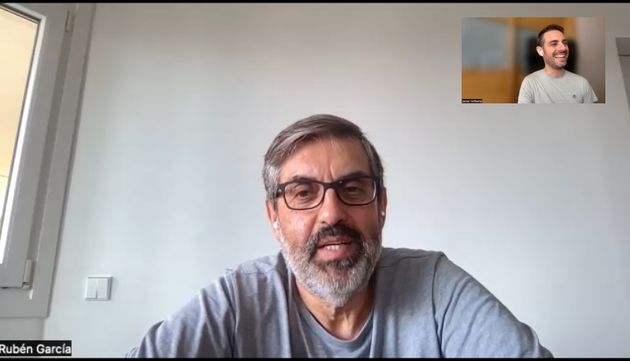Businessman Rubén García addresses the fast growth of the technology sector, the challenges of the current economic situation, and the importance of support among Christian business leaders.
![Photo: [link]Simon Abrams[/link]. Unsplash (CC0).](https://cms.evangelicalfocus.com/upload/imagenes/6320431c8361d_simonabrams.jpg) Photo: [link]Simon Abrams[/link]. Unsplash (CC0).
Photo: [link]Simon Abrams[/link]. Unsplash (CC0).
Few sectors have grown and evolved faster than the computer and information technology sector.
Rubén García, founding partner in 1987 of Main Memory, a company that offers technological solutions to companies, has been not only a spectator, but also a protagonist in a sector that is key to the development of any business.
In this fast-paced world, Rubén García tries to keep himself grounded in Christian principles and values that allow him to take a realistic and prudent perspective, with the confidence to understand that although difficult times lie ahead, they are also exciting.
Question. Tell us about your company; what is your current position, where are you, how many workers do you have?
Answer. Along with another friend, I founded our technology company in 1987. It currently has 70 employees. We are in Madrid, Valencia, Barcelona and we also have a person based in Seville. We provide technology services to other companies, mainly in Spain. They are medium and large companies, which have a large technological load and where they do not reach with their IT services, to put it simply, we try to go there.
Q. You started 35 years ago. Few sectors have changed as much in that time as the technology sector. How have you experienced it?
A. The Internet didn't exist. We even used faxes very much. The classic PC was very new. I remember that at that time not even many people in the industry believed in the future of the PC. It was a very new environment. And it's funny: we have seen companies that had dozens of people typing invoices, something that is now automated. So these are tremendous leaps that we have experienced.

Q. In a sector like this, you have to be constantly renewing yourselves and be at the cutting edge of technology.
A. On the one hand, we have to be committed to training and constant improvement, and on the other hand, the companies we serve need us to provide them with a certified service that meets their technological needs as they arise.
Furthermore, more and more things are interrelated, so we have to be up to date. It's a world that requires not only knowing the products, but also interconnecting them with each other. That's where our value lies: we can solve issues that the customer doesn't have the capacity to address.
Q. During the pandemic, we have seen many companies forced into the technology space. How has it affected a sector like yours?
A. Teleworking had a big spike, although it has now returned to normal, there are no more people teleworking than before the pandemic. But yes, we believe teleworking will increase.
This creates the need for secure communications: you need to invest in security. We see an increase in hacking, phishing and other dangers that really need solutions.

[photo_footer] Rubén García, visiting the construction site of the Nou Hospital Evangèlic in Barcelona, of which he is a member of the board of trustees.[/photo_footer]
Q. How has faith shaped your career path?
A. Faith is something intrinsic to people. It is like when you are father and mother, it's something you always carry with you. Your education, your culture and, of course, your faith.
For me, it has set a series of parameters of trust and red lines within which I have been able to move comfortably. Faith is something that has accompanied me since I made the decision to follow Christ.
Some people find it surprising that someone in the technology sector is a believer, and sometimes they ask me. I can then explain them that it is not an absurd faith, or a pious faith, but a reasoned and convincing faith.
Q. Sometimes, it has been considered that there are church issues and work issues. How do you experience this?
A. I decided a long time ago that I live in what is called integral mission: it doesn't matter if I am in the bakery, at the gym, at work or at church, I'm the same everywhere. I gave up that dichotomy, which it is true that we have all experienced, time ago.
We Christian businessmen have lived a somewhat stigmatised life. In the churches in Spain, perhaps because of the inheritance of a Catholic conception of poverty, it seems that it was frowned upon. In the United States, on the contrary, the "self-made" man is respected.
Here in Spain, however, anyone who did well in business was seen as a suspicious person. But, for this very reason, we adopted an integral vision of life and mission, being careful in everything, taking the mission to our environment.
As a boss, it is difficult to share the gospel with your employees without a sense that you are forcing someone to listen to something they don't want to hear. We must be careful not to use our positions of leadership to force others.
Q. Does the holistic view lead to biblical principles being applied, in some way, to your business or work?
A. Actually, if we remove the adjective biblical from those principles, we realise that they are basically principles of excellence. Sometimes we Christians have to suffer a certain amount of harassment and demolition of our faith or our values, when they are principles of wisdom, prudence, and confidence in what we believe in.
Those principles have served me well, especially when some questionable element approaches you, something that is in a dubious legal space, supposed business opportunities that could have a benefit, but you are wary of that because you are living by biblical principles that help you to stay focused.
It is also important to apply those principles in dealing with people. At a certain age, I see that I have a some prestige associated to my faith: people know how we work because we have those principles.

[photo_footer] A moment of the interview with Rubén García /DH.[/photo_footer]
Q. How do you reconcile work, family, ministry...?
A. The honest answer is that there is not one way to reconcile everything properly, you always end up annoying someone. Everything takes time, and although I have a schedule that is as planned as possible, you know that there are too many things left up in the air.
There are always things happening that end up breaking you somehow. Maybe that's the hardest question, because I try to handle it as gracefully as possible, but you don't always get to everything.
Especially with my family, I try to compensate them when it comes to time: if I have to go away for some days, then maybe we try to extend the holidays a little bit... But there is always a thorn in your side, because it is not possible to reconcile things without someone being affected. The key advice I have is that sometimes, you have to learn to say no.
Q. We are starting a new term, with important challenges in the labour and economic spheres. How do you assess the current situation?
A. I am pessimistic. There is a war in Europe that could become worse at any moment, in addition to the energy crisis that we are already experiencing; a pandemic that seems to be over but we don't know if it could resurface... all of this generates insecurity.
Furthermore, we have logistical problems, with a maritime container crisis that is pushing up prices. There is a problem with chip development because of the lack of basic materials. The United States and Europe thought that all the industrial development could be derived to China, and now we realise that this was not the best strategy.
I think China has been very badly treated, because it is very advanced in 5G technology and there have been attempts to hinder its development and expansion. Now China knows that it can stop other things and some of the decisions they make do not seem to have a business or professional logic, but a geopolitical one.
All of this creates a complex panorama in which we do not know what will happen.
On a professional level, we have had to adapt our company to sell fewer products and offer more services. We try to see how the market reacts, we have no control over it and it is so far beyond our reach that we have to take the situation with the utmost caution.
The rise in the Consumer Price Index of 12 or 15% in two years, when it had risen by 5 or 6 % in the previous fifteen years, raises another challenge.
Q. In your analysis, I perceive that perhaps we got to this situation in Europe because we have not done things right over the last few years. What is your perspective on our continent?
A. Current Europe has changed very much, it even considers itself to be post-Christian. We thought that living like the first world would be permanent, but the truth is that things are happening faster and faster, and so are the cycles. We have a very serious problem.
We will see what will happen with Africa, a continent bigger than the United States and Europe combined and with more resources, which, as soon as it wakes up, will also compete. I don't know if we will get there in time, but we have clearly lost position.
This article was translated with permission from the 'Líderes Empresariales' (Business Leaders) initiative of the Spanish evangelical business network Tres-e.
[donate]

Las opiniones vertidas por nuestros colaboradores se realizan a nivel personal, pudiendo coincidir o no con la postura de la dirección de Protestante Digital.
Si quieres comentar o